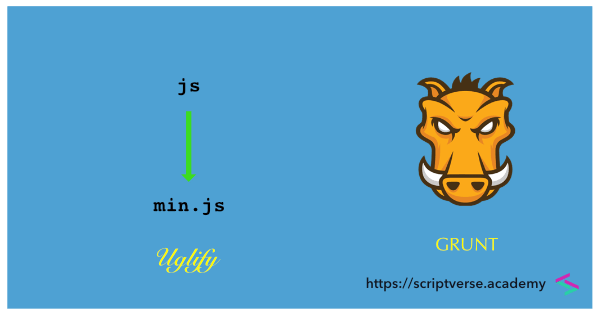Grunt: Uglify
Bundling and minification of JavaScript files can be achieved through the grunt-contrib-uglify plugin.
Navigate to the root directory of your project and run the command
npm install grunt-contrib-uglify --save-dev

The package.json file's devDependencies field will now have a new listing called grunt-contrib-uglify
"devDependencies": {
"grunt": "^0.4.5",
"grunt-contrib-uglify": "^1.0.1"
}
JS Uglify/File Minification
Below is an example set up of Gruntfile.js to minify test.js and sample.js files inside the src/js directory and output the respective minified files into the dist/js directory
module.exports = function(grunt) {
grunt.initConfig({
pkg: grunt.file.readJSON('package.json'),
uglify: {
dist:{
files: {
'dist/js/test.min.js':'src/js/test.js',
'dist/js/sample.min.js':'src/js/sample.js'
}
}
}
});
}
The grunt-contrib-uglify plugin needs to be loaded next, which is done by passing the plugin name as an argument to the grunt.loadNpmTasks() method
module.exports = function(grunt) {
grunt.initConfig({
pkg: grunt.file.readJSON('package.json'),
uglify: {
dist:{
files: {
'dist/js/test.min.js':'src/js/test.js',
'dist/js/sample.min.js':'src/js/sample.js'
}
}
}
});
grunt.loadNpmTasks('grunt-contrib-uglify');
}
Minification of JS files can now be achieved by running the command
grunt uglify
But a task, or a set of tasks, can be run together under an "alias task". The grunt.registerTask function serves this purpose. The first argument is the task name. In the example below, we define a default task name. The second argument is an array of tasks to run. We add our minification task (uglify) into this array. Gruntfile.js now has the structure
module.exports = function(grunt) {
grunt.initConfig({
pkg: grunt.file.readJSON('package.json'),
uglify: {
dist:{
files: {
'dist/js/test.min.js':'src/js/test.js',
'dist/js/sample.min.js':'src/js/sample.js'
}
}
}
});
grunt.loadNpmTasks('grunt-contrib-uglify');
grunt.registerTask('default', ['uglify']);
}
The default task defined can be run just by typing grunt into the terminal without specifying a particular task. In our case, the below command will run the uglify task
grunt
The JavaSscript files test.js and sample.js can also be combined and minified into a single file common.js as
module.exports = function(grunt) {
grunt.initConfig({
pkg: grunt.file.readJSON('package.json'),
uglify: {
dist:{
files: {
'dist/js/common.js': ['src/js/test.js', 'src/js/sample.js']
}
}
}
});
grunt.loadNpmTasks('grunt-contrib-uglify');
grunt.registerTask('default', ['uglify']);
}